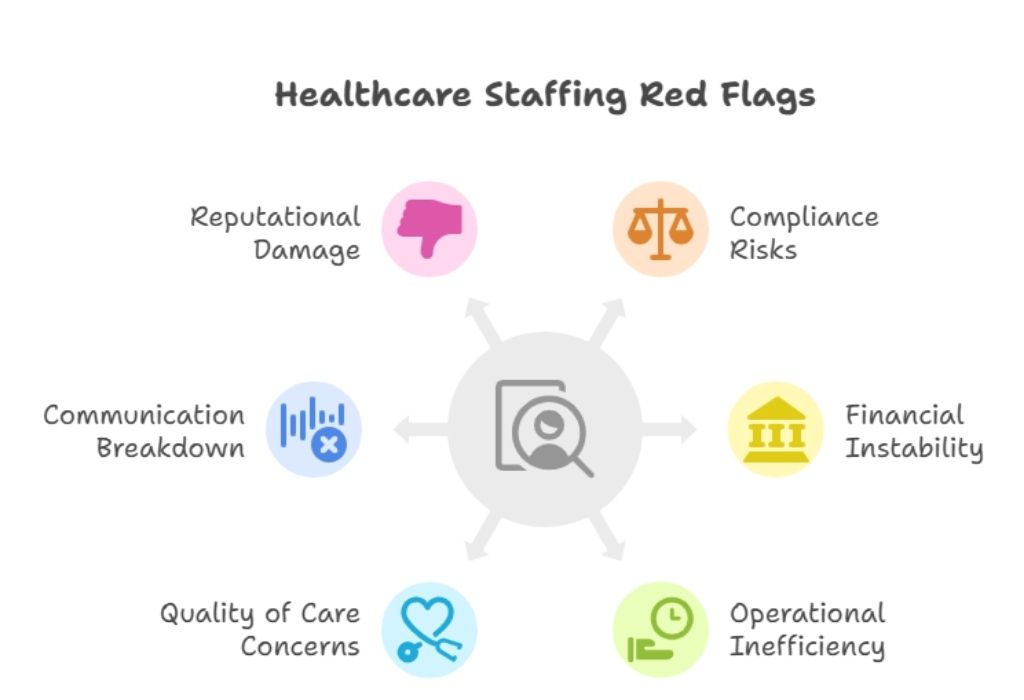Key Takeaways
Partnering with the wrong healthcare staffing agency can compromise patient care and operational stability.
Lack of compliance and weak credentialing processes are major red flags in staff augmentation.
Transparent pricing and clear contract terms are essential for building trustworthy staffing partnerships.
High turnover, poor retention, and negative reviews indicate unreliable staffing practices.
Healthcare organizations must prioritize due diligence to select staffing partners that enhance quality and efficiency.
Selecting the right healthcare staffing partner is a critical decision that directly impacts patient care quality, operational efficiency, and staff satisfaction. In today’s healthcare environment with persistent staffing shortages, partnering with a reputable staff augmentation company becomes crucial. Not all healthcare staffing agencies operate with the same level of professionalism, compliance, and transparency. Recognizing potential warning signs early in the selection process can help healthcare organizations avoid costly mistakes and partnership failures.
This article examines seven critical red flags that warrant caution when evaluating potential healthcare staffing partners.
Key red flags to avoid in healthcare staff augmentation

Lack of compliance with industry and legal standards
A reputable healthcare staffing agency must be properly licensed and accredited by relevant healthcare staffing organizations. If an agency cannot provide proof of credentials, this represents a significant red flag. Working with an unlicensed or unaccredited agency exposes healthcare facilities to compliance risks and potentially compromises patient care quality.
Legitimate staffing partners will readily demonstrate their adherence to industry standards, licensing requirements, and legal frameworks that govern healthcare staffing operations.
Vague pricing and unclear contract terms
Transparency in pricing and contract terms is fundamental to a trustworthy staffing partnership. Be wary of agencies that provide only general figures without detailed breakdowns of costs, taxable versus non-taxable components, or specific deductions. Contracts should clearly outline all financial aspects and avoid one-sided cancellation clauses that penalize your organization while offering flexibility to the agency.
A reputable staffing partner will provide written documentation of all costs and ensure you have adequate time to review contract terms before signing.
Poor track record in handling healthcare staffing challenges
Staffing agencies with limited experience or a history of inadequately addressing healthcare-specific challenges present significant risks. These agencies may lack understanding of the unique demands of healthcare environments, specialty-specific requirements, or the ability to respond to urgent staffing needs. When evaluating potential partners, investigate their track record of successfully placing qualified professionals in similar healthcare settings.
Request specific examples of how they’ve solved complex staffing challenges and adapted to changing healthcare demands.
High turnover and dissatisfaction among placed staff
Agencies that consistently experience high turnover rates among placed professionals may have fundamental issues with their recruitment, matching, or support processes.
This instability directly impacts continuity of care and increases administrative burden on healthcare facilities. Ask potential staffing partners about their retention rates and request data on average assignment duration. Additionally, inquire about their methods for ensuring job satisfaction among placed professionals and how they address concerns that arise during placements.
Inadequate screening or credentialing processes
Thorough vetting of healthcare professionals is non-negotiable for quality patient care and regulatory compliance. Red flags in credentialing processes include incomplete applications, vague references, unexplained employment gaps, or frequent job changes among candidates. Reputable staffing agencies implement comprehensive screening protocols that verify education, licensure, certifications, and professional history.
They should be transparent about their credentialing standards and willing to share their processes for background checks, skills assessment, and ongoing monitoring of credentials.
Weak communication or delayed responsiveness
Effective healthcare staffing requires prompt, clear communication. Agencies that demonstrate delayed responses during the initial engagement phase will likely exhibit similar patterns throughout the partnership. This can be particularly problematic when urgent staffing needs arise. Evaluate potential partners based on their communication systems, availability during critical hours, and response protocols.
A quality staffing partner should provide designated points of contact, demonstrate consistent follow-through on commitments, and maintain regular communication regarding placement status and potential issues.
Negative reviews or signs of bad staffing agencies online
Online reputation offers valuable insights into an agency’s reliability and service quality. Multiple negative reviews citing similar issues suggest systemic problems rather than isolated incidents.
Research potential partners through industry forums, professional networks, and review platforms. [MedCadre] Pay particular attention to comments about payment practices, contract adherence, and quality of placed professionals. While no agency will have perfect reviews, patterns of complaints about fundamental business practices or ethical concerns should be considered serious warning signs.
Conclusion
Selecting a healthcare staffing partner requires careful evaluation beyond surface-level promises. By recognising these seven red flags, healthcare organizations can avoid partnerships that jeopardise quality care, staff satisfaction, and operational efficiency.
The ideal staffing partner demonstrates compliance with industry standards, transparent business practices, proven success in healthcare environments, thorough credentialing processes, and responsive communication. Taking time to conduct proper due diligence during the selection process ultimately saves resources and ensures your organization benefits from a staffing relationship that enhances patient care rather than complicates it.
FAQs
What are the red flags in healthcare staff augmentation?
Lack of licensing, vague pricing, poor track record, high turnover, weak credentialing, slow communication, and negative reviews.
How can I verify a staffing partner’s credentials?
Ask for licenses, accreditations, and memberships. Cross-check with regulatory bodies and request client references.
What are signs of bad staffing agencies?
Pressure to sign quickly, unclear fees, no references, high recruiter turnover, weak regulatory knowledge, and unqualified candidates.
Why is transparency important in healthcare staffing contracts?
Clear pricing and contract terms prevent hidden costs, protect against unfair clauses, and build trust in the partnership.
How does staff turnover affect healthcare organizations?
High turnover disrupts patient care, increases costs, and puts added strain on permanent staff.





